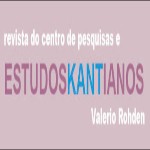WHAT LEIBNIZ MISSED – OR KANT MISREAD? KANT’S CRITIQUE OF LEIBNIZIAN METAPHYSICS IN LIGHT OF TWO RECENT INTERPRETATIONS
v. 4 n. 2 (2016) • Estudos Kantianos [EK]
Autor: Andree HAHMANN
Resumo:
Kant famously criticizes Leibniz for his apparent neglect to observe the difference between two sources of cognition: understanding and intuition. This is the reason that Leibniz supposedly intellectualized the phenomena by identifying them with things in themselves. In Kantian terms, Leibniz fell prey to an amphiboly of concepts which, in the case of his understanding of substance, has led him to assume monads—that is to say, ideal unities which exist in a state of pre-established harmony; for this is the only possible form of community between ideal substances. Distinct versions of this argument can be found in Kant’s Critique of Pure Reason, notably in the notoriously difficult passage entitled “On the amphiboly of concepts of reflections”, and in some later writings, such as the Kantian reply to the self-declared Leibnizian Johann August Eberhard (On a Discovery whereby any New Critique of Pure Reason is to be made Superfluous by an Older One, from 1790) or the late fragment What Real Progress has Metaphysics made in Germany since the Time of Leibniz and Wolff? (originally from 1793, but published post mortem in 1804).
Texto Completo: http://www2.marilia.unesp.br/revistas/index.php/ek/article/view/6663

Estudos Kantianos [EK]
Revista do Centro de Pesquisa e Estudos Kantianos Valério Rohden
